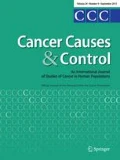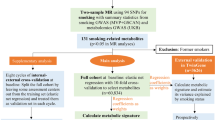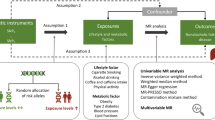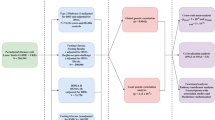Abstract
Purpose
Evaluating genetic susceptibility may clarify effects of known environmental factors and also identify individuals at high risk. We evaluated the association of four insulin-related pathway gene polymorphisms in insulin-like growth factor-1 (IGF-I) (CA) n repeat, insulin-like growth factor-2 (IGF-II) (rs680), insulin-like growth factor–binding protein-3 (IGFBP-3) (rs2854744), and adiponectin (APM1 rs1501299) with colon cancer risk, as well as relationships with circulating IGF-I, IGF-II, IGFBP-3, and C-peptide in a population-based study.
Methods
Participants were African Americans (231 cases and 306 controls) and Whites (297 cases, 530 controls). Consenting subjects provided blood specimens and lifestyle/diet information. Genotyping for all genes except IGF-I was performed by the 5′-exonuclease (Taqman) assay. The IGF-I (CA) n repeat was assayed by PCR and fragment analysis. Circulating proteins were measured by enzyme immunoassays. Odds ratios (ORs) and 95 % confidence intervals (CIs) were calculated by logistic regression.
Results
The IGF-I (CA) 19 repeat was higher in White controls (50 %) than African American controls (31 %). Whites homozygous for the IGF-I (CA)19 repeat had a nearly twofold increase in risk of colon cancer (OR = 1.77; 95 % CI = 1.15–2.73), but not African Americans (OR = 0.73, 95 % CI 0.50–1.51). We observed an inverse association between the IGF-II Apa1 A-variant and colon cancer risk (OR = 0.49, 95 % CI 0.28–0.88) in Whites only. Carrying the IGFBP-3 variant alleles was associated with lower IGFBP-3 protein levels, a difference most pronounced in Whites (p-trend <0.05).
Conclusions
These results support an association between insulin pathway-related genes and elevated colon cancer risk in Whites but not in African Americans.

Similar content being viewed by others
References
Jemal A, Siegel R, Ward E, Hao Y, Xu J, Murray T, Thun MJ (2008) Cancer statistics 2008. CA Cancer J Clin 58:71–96
Giovannucci E (2001) Insulin, insulin-like growth factors and colon cancer: a review of the evidence. J Nutr 131(11 suppl):3109S–3120S
Giovannucci E (1995) Insulin and colon cancer. Cancer Causes Control 6:164–179
Keku TO, Lund PK, Galanko J, Simmons JG, Woosley JT, Sandler RS (2005) Insulin resistance, apoptosis, and colorectal adenoma risk. Cancer Epidemiol Biomarkers Prev 14:2076–2081
Le Marchand L, Kolonel LN, Henderson BE, Wilkens LR (2005) Association of an exon 1 polymorphism in the IGFBP3 gene with circulating IGFBP-3 levels and colorectal cancer risk: the multiethnic cohort study. Cancer Epidemiol Biomarkers Prev 14:1319–1321
Slattery ML, Murtaugh M, Caan B, Ma KN, Neuhausen S, Samowitz W (2005) Energy balance, insulin-related genes and risk of colon and rectal cancer. Int J Cancer 115:148–154
Wernli KJ, Newcomb PA, Wang Y, Makar KW, Shadman M, Chia VM, Burnett-Hartman A, Wurscher MA, Zheng Y, Mandelson MT (2010) Body size, IGF and growth hormone polymorphisms, and colorectal adenomas and hyperplastic polyps. Growth Horm IGF Res 20:305–309
Giovannucci E, Pollak MN, Platz EA, Willet WC, Stampfer MJ, Majeed N, Colditz GA, Speizer FE, Hankinson SE (2000) A prospective study of plasma insulin-like growth factor-1 and binding protein-3 and risk of colorectal neoplasia in women. Cancer Epidemiol Biomarkers Prev 9:345–349
Kaaks R, Toniolo P, Akhmedkhanov A, Lukanova A, Biessy C, Dechaud H, Rinaldi S, Zeleniuch-Jacquotte A, Shore RE, Riboli E (2000) Serum C-peptide, insulin-like growth factor (IGF)-I, IGF-binding proteins, and colorectal cancer risk in women. J Natl Cancer Inst 92:1592–1600
Ma J, Pollak MN, Giovannucci E, Chan JM, Tao Y, Hennekens CH, Stampfer MJ (1999) Prospective study of colorectal cancer risk in men and plasma levels of insulin-like growth factor (IGF)-I and IGF-binding protein-3. J Natl Cancer Inst 91:620–625
Nomura AM, Stemmermann GN, Lee J, Pollak MN (2003) Serum insulin-like growth factor I and subsequent risk of colorectal cancer among Japanese–American men. Am J Epidemiol 158:424–431
Palmqvist R, Hallmans G, Rinaldi S, Biessy C, Stenling R, Riboli E, Kaaks R (2002) Plasma insulin-like growth factor 1, insulin-like growth factor binding protein 3, and risk of colorectal cancer: a prospective study in northern Sweden. Gut 50:642–646
Probst-Hensch NM, Yuan JM, Stanczyk FZ, Gao YT, Ross RK, Yu MC (2001) IGF-1, IGF-2 and IGFBP-3 in prediagnostic serum: association with colorectal cancer in a cohort of Chinese men in Shanghai men. Br J Cancer 85:1695–1699
Gunter MJ, Leitzmann MF (2006) Obesity and colorectal cancer: epidemiology, mechanisms and candidate genes. J Nutr Biochem 17:145–156
Giovannucci E, Pollak M, Platz EA, Willet WC, Stampfer MJ, Majeed N, Colditz GA, Speizer FE, Hankinson SE (2000) Insulin-like growth factor I (IGF-I), IGF-binding protein-3 and the risk of colorectal adenoma and cancer in the Nurses’ Health Study. Growth Horm IGF Res 10(suppl A):S30–S31
Sridhar SS (2009) Insulin–insulin-like growth factor axis and colon cancer. J Clin Oncol 27:165–167
McElhom AR, McKnight A-J, Patterson CC, Johnston BT, Hardie LJ, Murray LJ, The Finbar Group (2010) A population-based study of IGF axis polymorphisms and the esophageal inflammation, metaplasia, adenocarcinoma sequence. Gastroenterology 139:204–212
Rotwein P, Pollock KM, Didier DK, Krivi GG (1986) Organization and sequence of the human insulin-like growth factor I gene. Alternative RNA processing produces two insulin-like growth factor I precursor peptides. J Biol Chem 261:4828–4832
DeLellis K, Ingles S, Kolonel L, McKean-Codwin R, Henderson B, Stanczyk F, Probst-Hensch NM (2003) IGF1 genotype, mean plasma level and breast cancer risk in the Hawaii/Los Angeles multiethnic cohort. Br J Cancer 88:277–282
Frayling TM, Hattersley AT, McCarthy A, Holly J, Mitchell SM, Gloyn AL, Owen K, Davies D, Smith GD, Ben-Shlomo Y (2002) A putative functional polymorphism in the IGF-I gene: association studies with type 2 diabetes, adult height, glucose tolerance, and fetal growth in U.K. populations. Diabetes 51:2313–2316
Harrela M, Koistinen H, Kaprio J, Lehtovirta M, Tuomilehto J, Eriksson J, Toivanen L, Koskenuvo M, Leinonen P, Koistinen R, Seppala M (1996) Genetic and environmental components of interindividual variation in circulating levels of IGF-I, IGF-II, IGFBP-1, and IGFBP-3. J Clin Invest 98:2612–2615
Missmer SA, Haiman CA, Hunter DJ, Willet WC, Colditz GA, Speizer FE, Pollak MN, Hankinson SE (2002) A sequence repeat in the insulin-like growth factor-1 gene and risk of breast cancer. Int J Cancer 100:332–336
Rietveld I, Janssen JA, Hofman A, Pols HA, van Duijn CM, Lamberts SW (2003) A polymorphism in the IGF-I gene influences the age-related decline in circulating total IGF-I levels. Eur J Endocrinol 148:171–175
Rosen CJ, Kurland ES, Vereault D, Adler RA, Rackoff PJ, Craig WY, Witte S, Rogers J, Bilezikian JP (1998) Association between serum insulin growth factor-I (IGF-I) and a simple sequence repeat in IGF-I gene: implications for genetic studies of bone mineral density. J Clin Endocrinol Metab 83:2286–2290
Vaessen N, Heutink P, Janssen JA, Witteman JC, Testers L, Hofman A, Lamberts SW, Oostra BA, Pols HA, van Duijn CM (2001) A polymorphism in the gene for IGF-I: functional properties and risk for type 2 diabetes and myocardial infarction. Diabetes 50:637–642
Deal C, Ma J, Wilkin F, Paquette J, Rozen F, Ge B, Hudson T, Stampfer M, Pollak M (2001) Novel promoter polymorphism in insulin-like growth factor-binding protein-3: correlation with serum levels and interaction with known regulators. J Clin Endocrinol Metab 86:1274–1280
Wong HL, Delellis K, Probst-Hensch N, Koh WP, Van Den Berg D, Lee HP, Yu MC, Ingles SA (2005) A new single nucleotide polymorphism in the insulin-like growth factor I regulatory region associates with colorectal cancer risk in Singapore Chinese. Cancer Epidemiol Biomarkers Prev 14:144–151
Zhao R, Berho M, Nogueras J, Sands D, Weiss E, Wexner S, Giardiello FM, Cruz-Correa M (2005) Positive correlation of insulin-like growth factor-II with proliferating cell index in patients with colorectal neoplasia. Cancer Epidemiol Biomarkers Prev 14:1819–1822
Renehan AG, Jones J, Potten CS, Shalet SM, O’Dwyer ST (2000) Elevated serum insulin-like growth factor (IGF)-II and IGF binding protein-2 in patients with colorectal cancer. Br J Cancer 83:1344–1350
Cui H, Onyango P, Brandenburg S, Wu Y, Hsieh CL, Feinberg AP (2002) Loss of imprinting in colorectal cancer linked to hypomethylation of H19 and IGF2. Cancer Res 62:6442–6446
Winkler R, Delacroix L, Bensbaho K, Lambert S, Collette J, Hodzic D (1999) IGF-II in primary human colorectal tumors: peptide level, activated promoters, parental imprinting and gene rearrangement. Horm Metab Res 31:148–154
Tadokoro K, Fujii H, Inoue T, Yamada M (1991) Polymerase chain reaction (PCR) for detection of ApaI polymorphism at the insulin like growth factor II gene (IGF2). Nucleic Acids Res 19:6967
Yamauchi T, Kamon J, Minokoshi Y et al (2002) Adiponectin stimulates glucose utilization and fatty-acid oxidation by activating AMP-activated protein kinase. Nat Med 8:1288–1295
Bacci S, Menzaghi C, Ercolino T, Ma X, Rauseo A, Salvemini L, Vigna C, Fanelli R, Di Mario U, Doria A, Trischitta V (2004) The +276 G/T single nucleotide polymorphism of the adiponectin gene is associated with coronary artery disease in type 2 diabetic patients. Diabetes Care 27:2015–2020
Vasseur F, Lepretre F, Lacquemant C, Froguel P (2003) The genetics of adiponectin. Curr Diab Rep 3:151–158
Gil-Campos M, Canete RR, Gil A (2004) Adiponectin, the missing link in insulin resistance and obesity. Clin Nutr 23:963–974
Feik E, Baierl A, Hieger B, Führlinger G, Pentz A, Stättner S, Weiss W, Pulgram T, Leeb G, Mach K, Micksche M, Gsur A (2010) Association of IGF1 and IGFBP3 polymorphisms with colorectal polyps and colorectal cancer risk. Cancer Causes Control 21:91–97
Wong HL, Koh WP, Probst-Hensch NM, Van den Berg D, Yu MC, Ingles SA (2008) Insulin-like growth factor-1 promoter polymorphisms and colorectal cancer: a functional genomics approach. Gut 57:1090–1096
Slattery ML, Samowitz W, Curtin K, Ma KN, Hoffman M, Caan B, Neuhausen S (2004) Associations among IRS1, IRS2, IGF1, and IGFBP3 genetic polymorphisms and colorectal cancer. Cancer Epidemiol Biomarkers Prev 13:1206–1214
He B, Pan Y, Zhang Y, Bao Q, Chen L, Nie Z, Gu L, Xu Y, Wang S (2011) Effects of genetic variations in the adiponectin pathway genes on the risk of colorectal cancer in the Chinese population. BMC Med Genet 12:94
Lin JK, Shen MY, Lin TC, Lan YT, Wang HS, Yang SH, Li AF, Chang SC (2010) Distribution of a single nucleotide polymorphism of insulin-like growth factor-1 in colorectal cancer patients and its association with mucinous adenocarcinoma. Int J Biol Markers 25:195–199
Satia JA, Campbell MK, Galanko JA, James A, Carr C, Sandler RS (2004) Longitudinal changes in lifestyle behaviors and health status in colon cancer survivors. Cancer Epidemiol Biomarkers Prev 13:1022
Satia JA, Tseng M, Galanko JA, Martin C, Sandler RS (2009) Dietary patterns and colon cancer risk in Whites and African Americans in the North Carolina Colon Cancer Study. Nutr Cancer 61:179–193
Butler LM, Millikan RC, Sinha R, Keku TO, Winkel S, Harlan B, Eaton A, Gammon MD, Sandler RS (2008) Modification by N-acetyltransferase 1 genotype on the association between dietary heterocyclic amines and colon cancer in a multiethnic study. Mutat Res 638:162–174
Keku T, Millikan R, Worley K, Winkel S, Eaton A, Biscocho L, Martin C, Sandler R (2002) 5,10-Methylenetetrahydrofolate reductase codon 677 and 1298 polymorphisms and colon cancer in African Americans and whites. Cancer Epidemiol Biomarkers Prev 11:1611–1621
Block G, Hartman AM, Dresser CM, Carroll MD, Gannon J, Gardner L (1986) A data-based approach to diet questionnaire design and testing. Am J Epidemiol 124:453–469
Block G (1991) Dietary guidelines and the results of food consumption surveys. Am J Clin Nutr 53:356S–357S
Willet WC (1990) Nutritional Epidemiology. Oxford University Press, New York, NY
Collet D (1994) Modeling survival data in medical research. Chapman & Hall, Boca Raton
Hernandez W, Grenade C, Santos ER, Bonilla C, Ahaghotu C, Kittles RA (2007) IGF-1 and IGFBP-3 gene variants influence on serum levels and prostate cancer risk in African-Americans. Carcinogenesis 28:2154–2159
Schildkraut JM, Demark-Wahnefried W, Wenham RM, Grubber J, Jeffreys AS, Grambow SC, Marks JR, Moorman PG, Hoyo C, Ali S, Walther PJ (2005) IGF1 (CA)19 repeat and IGFBP3 -202 A/C genotypes and the risk of prostate cancer in Black and White men. Cancer Epidemiol Biomarkers Prev 14:403–408
Takacs I, Koller DL, Peacock M, Christian JC, Hui SL, Conneally PM, Johnston CC Jr, Foround T, Econs MJ (1999) Sibling pair linkage and association studies between bone mineral density and the insulin-like growth factor I gene locus. J Clin Endocrinol Metab 84:4467–4471
Tran N, Bharaj BS, Diamandis EP, Smith M, Li BD, Yu H (2004) Short tandem repeat polymorphism and cancer risk: influence of laboratory analysis on epidemiologic findings. Cancer Epidemiol Biomarkers Prev 13:2133–2140
Ruchat SM, Loos RJ, Rankinen T, Vohl MC, Weisnagel SJ, Després JP, Bouchard C, Pérusse L (2008) Associations between glucose tolerance, insulin sensitivity and insulin secretion phenotypes and polymorphisms in adiponectin and adiponectin receptor genes in the Quebec Family Study. Diabet Med 25:400–406
Gu HF, Abulaiti A, Ostenson CG, Humphreys K, Wahlestedt C, Brookes AJ, Efendic S (2004) Single nucleotide polymorphisms in the proximal promoter region of the adiponectin (APM1) gene are associated with type 2 diabetes in Swedish caucasians. Diabetes 53:S31–S35
Hong Y, Pedersen NL, Brismar K, Hall K, de Faire U (1996) Quantitative genetic analyses of insulin-like growth factor I (IGF-I), IGF-binding protein-1, and insulin levels in middle-aged and elderly twins. J Clin Endocrinol Metab 81:1791–1797
Kao PC, Matheny AP Jr, Lang CA (1994) Insulin-like growth factor-I comparisons in healthy twin children. J Clin Endocrinol Metab 78:310–312
Verhaeghe J, Loos R, Vlietinck R, Herck EV, van Bree R, Schutter AM (1996) C-peptide, insulin-like growth factors I and II, and insulin-like growth factor binding protein-1 in cord serum of twins: genetic versus environmental regulation. Am J Obstet Gynecol 175:1180–1188
The International HapMap 3 Consortium (2010) Integrating common and rare genetic variation in diverse human populations. Nature 467:52–58
Morimoto LM, Newcomb PA, White E, Bigler J, Potter JD (2005) Insulin-like growth factor polymorphisms and colorectal cancer risk. Cancer Epidemiol Biomarkers Prev 14:1204–1211
Giovannucci E, Haiman CA, Platz EA, Hankinson SE, Pollak MN, Hunter DJ (2002) Dinucleotide repeat in the insulin-like growth factor-I gene is not related to risk of colorectal adenoma. Cancer Epidemiol Biomarkers Prev 11:1509–1510
Hoyo C, Grubber J, Denmark-Wahnefried W, Lobaugh B, Jeffreys AS, Grambow SC, Marks JR, Keku TO, Walther PJ, Shildkraut JM (2009) Predictors of variation in serum IGF-I and IGFBP-3 levels in healthy African American and White men. J Natl Med Assoc 101:711–716
Hoyo C, Grubber J, Demark-Wahnefried W, Marks JR, Freedland SJ, Jeffreys AS, Grambow SC, Wenham RM, Walther PJ, Schildkraut JM (2007) Grade-specific prostate cancer associations of IGF1 (CA)19 repeats and IGFBP3-202A/C in blacks and whites. J Natl Med Assoc 99:718–722
Chen HY, Chan HIS, Sham ALK, Leung VHK, Ma SL, Ho SC (2011) Haplotype effect in the IGF1 promoter accounts for the association between microsatellite and serum IGF1 concentration. Clin Endocrinol 74:520–527
Fuchs CS, Goldberg RM, Sargent DJ, Meyerhardt JA, Wolpin BM, Green EM, Pitot HC, Pollak M (2008) Plasma insulin-like growth factors, insulin-like binding protein-3, and outcome in metastatic colorectal cancer: results from intergroup trial N9741. Clin Cancer Res 14:8263–8269
Gallego R, Codony-Serval J, Garcia-Albeniz X, Carcereny E, Longaron R, Oliveras A, Tosca M, Auge JM, Gascon P, Maurel J (2009) Serum IGF-1, IGFBP-3, and matrix metalloproteinase-7 levels and acquired chemo-resistance in advanced colorectal cancer. Endocr Relat Cancer 16:311–317
Cruz-Correa M, Cui H, Giardiello FM, Powe NR, Hylind L, Robinson A, Hutcheon DF, Kafonek DR, Brandenburg S, Wu Y, He X, Feinberg AP (2004) Loss of imprinting of insulin growth factor II gene: a potential heritable biomarker for colon neoplasia predisposition. Gastroenterology 126:964–970
Martinez ME, Giovannucci E, Spiegelman D, Hunter DJ, Willett WC, Colditz GA (1997) Leisure-time physical activity, body size, and colon cancer in women. Nurses’ Health Study Research Group. J Natl Cancer Inst 89:948–955
MacInnis RJ, English DR, Hopper JL, Haydon AM, Gertig DM, Giles GG (2004) Body size and composition and colon cancer risk in men. Cancer Epidemiol Biomarkers Prev 13:553–559
Schoen RE, Tangen CM, Kuller LH, Burke GL, Cushman M, Tracy RP, Dobs A, Savage PJ (1999) Increased blood glucose and insulin, body size, and incident colorectal cancer. J Natl Cancer Inst 91:1147–1154
Berg AH, Combs TP, Du X, Brownlee M, Scherer PE (2001) The adipocyte-secreted protein Acrp30 enhances hepatic insulin action. Nat Med 7:947–953
Filippi E, Sentinelli F, Trischitta V, Romeo S, Arca M, Leonetti F, Di Mario U, Baroni MG (2004) Association of the human adiponectin gene and insulin resistance. Eur J Hum Genet 12:199–205
Kaklamani VG, Wisinski KB, Sadim M, Gulden C, Do A, Offit K, Baron JA, Ahsan H, Mantzoros C, Pasche B (2008) Variants of the adiponectin (ADIPOQ) and adiponectin receptor 1 (ADIPOR1) genes and colorectal cancer risk. JAMA 300:1523–1531
Menzaghi C, Ercolino T, Di Paola R, Berg AH, Warram JH, Scherer PE, Trischitta V, Doria A (2002) A haplotype at the adiponectin locus is associated with obesity and other features of the insulin resistance syndrome. Diabetes 51:2306–2312
Shetty GK, Economides PA, Horton ES, Mantzoros CS, Veves A (2004) Circulating adiponectin and resistin levels in relation to metabolic factors, inflammatory markers, and vascular reactivity in diabetic patients and subjects at risk for diabetes. Diabetes Care 27:2450–2457
Vionnet N, Hani EH, Dupont S, Gallina S, Francke S, Dotte S, De Matos F, Durand E, Lepretre F, Lecoeur F, Gallina P, Zekiri L, Dina C, Froquel P (2000) Genomewide search for type 2 diabetes-susceptibility genes in French whites: evidence for a novel susceptibility locus for early-onset diabetes on chromosome 3q27-qter and independent replication of a type 2-diabetes locus on chromosome 1q21-q24. Am J Hum Genet 67:1470–1480
Wei EK, Giovannucci E, Fuchs CS, Willett WC, Mantzoros CS (2005) Low plasma adiponectin levels and risk of colorectal cancer in men: a prospective study. J Natl Cancer Inst 97:1688–1694
Lukanova A, Soderberg S, Kaaks R, Jellum E, Stattin P (2005) Serum adiponectin is not associated with risk of colorectal cancer. Cancer Epidemiol Biomarkers Prev 15:401–402
Vasseur F, Helbecque N, Dina C, Lobbens S, Delannoy V, Gaget S, Boutin P, Vaxillaire M, Lepretre F, Dupont S, Hara K, Clement K, Bihain B, Kadowaki T, Froquel P (2002) Single-nucleotide polymorphism haplotypes in the both proximal promoter and exon 3 of the APM1 gene modulate adipocyte-secreted adiponectin hormone levels and contribute to the genetic risk for type 2 diabetes in French Caucasians. Hum Mol Genet 11:2607–2614
Hara K, Boutin P, Mori Y, Tobe K, Dina C, Yasuda K, Yamauchi T, Otabe S, Okada T, Eto K, Kadowaki H, Hagura R, Akanuma Y, Yazaki Y, Nagai R, Taniyama M, Matsubara K, Yoda M, Nakano Y, Tomita M, Kimura S, Ito C, Froquel P, Kadowaki T (2002) Genetic variation in the gene encoding adiponectin is associated with an increased risk of type 2 diabetes in the Japanese population. Diabetes 51:536–540
Wolpin BM, Meyerhardt JA, Chan AT, Ng K, Chan JA, Wu K, Pollak MN, Giovanucc EL, Fuchs CS (2011) Insulin, the insulin-like growth factor axis, and mortality in patients with nonmetastatic colorectal cancer. J Clin Oncol 27:176–185
Ma J, Giovannucci E, Pollak M, Leavitt A, Tao Y, Gaziano JM, Stampfer MJ (2004) A prospective study of plasma C-peptide and colorectal cancer risk in men. J Natl Cancer Inst 96:546–553
Palmqvist R, Stattin P, Rinaldi S, Biessy C, Stenling R, Riboli E, Hallmans G, Kaaks R (2003) Plasma insulin, IGF-binding proteins-1 and -2 and risk of colorectal cancer: a prospective study in northern Sweden. Int J Cancer 107:89–93
Manousos O, Souglakos J, Bosetti C, Tzonou A, Chatzidakis V, Trichopoulos D, Adami HO, Mantzoros C (1999) IGF-I and IGF-II in relation to colorectal cancer. Int J Cancer 83:15–17
Acknowledgments
This project was supported in part by grants from the National Institutes of Health K01 CA93654, P30 DK 034987 and R01 CA 66635, P50 CA 106991 and the Howard Hughes Medical Institute (HHMI) support for the UNC Program in Minority access to Biomedical Science (PMABs).
Author information
Authors and Affiliations
Corresponding author
Rights and permissions
About this article
Cite this article
Keku, T.O., Vidal, A., Oliver, S. et al. Genetic variants in IGF-I, IGF-II, IGFBP-3, and adiponectin genes and colon cancer risk in African Americans and Whites. Cancer Causes Control 23, 1127–1138 (2012). https://doi.org/10.1007/s10552-012-9981-2
Received:
Accepted:
Published:
Issue Date:
DOI: https://doi.org/10.1007/s10552-012-9981-2




